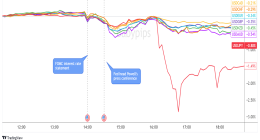
At a food pantry in the Kensington neighborhood of Philadelphia, the line starts more than an hour before the doors open on some days and has been steadily growing — from around 50 to 60 people earlier this year to more than 75 in recent months.
Francheska Serrano, who heads up the pantry operations there for Community Center at Visitation, said those showing up in line are struggling with the continuing rise in the price of food and a decrease in pandemic-era benefits for everything from groceries to rent.
“I’m definitely seeing a lot of new faces and an increase in the number of people who come to our food pantry,” Serrano said. “I can only assume that it’s just going to continue, especially with a cutback in the food benefits.”
Despite historically low unemployment and rising wages, the need for food assistance has been on the rise this year, according to government data, consumer surveys and interviews with nonprofit organizations. But on Capitol Hill, curbing food benefits has become front and center in the latest budget battle that could come to a head by the end of the month, when key pieces of funding legislation are set to expire.
Congressional Republicans pushed through new restrictions to the Supplemental Nutrition Assistance Program, formerly known as food stamps, in negotiations earlier this year over raising the government’s debt limit. But some are looking to add further restrictions to the program and roll back benefit increases as they negotiate a new farm bill before the current legislation expires Sept. 30.
“I think that Congress is in this really odd and unique political and economic environment,” said Tarren Bragdon, head of the Foundation for Government Accountability, which is lobbying for further requirements and cuts to SNAP. “At the same time that we have huge deficits, we also have low unemployment and millions of open jobs. So I’m optimistic that these commonsense, bipartisan solutions can get advanced.”
The push comes at a time of growing need. The number of Americans who receive SNAP benefits increased to 42 million as of May, up 2.3% from a year earlier and around 13% since the start of the pandemic. Consumer spending data from May showed that 47% of households earning less than $50,000 per year reported receiving food assistance, up from 39% in February before the end of a Covid-era emergency allotment that increased the amount of money SNAP recipients received each month, according to data firm Morning Consult.
Among Feeding America’s network of 200 food banks, 80% have seen demand for food assistance increase or remain steady in recent months, said Vince Hall, head of government relations for the group. Contributing to the rising demand are higher food prices along with the expiration of Covid-era assistance for food, rent, utilities and child care, Hall said.
“This is the first time in the history of food banking that we’ve seen record low unemployment coupled with record high demand for food assistance and food banks,” Hall said. “The economic crisis that’s causing millions and millions of families to turn to food banks for assistance has not abated, and people are still struggling and are still wondering where they’re going to get their next meal.”
A key area where Republicans are pushing for changes is around so-called work requirements. Until last month, most childless adults without a disability between the ages of 18 and 49 had to document at least 80 hours a month of work in order to qualify for more than three months of benefits over a three-year period. But under legislation passed earlier this year to raise the government’s borrowing limit, that age requirement was increased to 50 years old starting this month and will eventually go to age 54 by October 2024.
“We need a work requirement,” said Sen. John Kennedy, R-La. “I think that if you’re — certainly if you’re under the age of 55, and you’re able-bodied and you don’t have kids at home, you ought to be encouraged to work.”
Republican proposals have called for expanding the age further to 65 years old and eliminating recent work-requirement exemptions added in the debt ceiling legislation for veterans, people who are unhoused and young adults exiting the foster care system. Those changes would eliminate benefits for at least 3 million people, according to the Congressional Budget Office.
The Foundation for Government Accountability is also pushing Congress to require adults with school-age children to be added to those who have to meet the 80-hour-a-month work requirements.
Monique Williams, director of partnerships and development for Bread of Life, which distributes fresh produce to approximately 10,000 to 13,000 families per month, said many of the people her organization serves are already working, but still unable to afford enough food for themselves or their families.
“Many people who come here are working,” she said. “But their paychecks don’t always stretch to cover everything.”
While inflation has slowed, the cost of goods overall hasn’t been declining. The cost of food eaten at home increased 3.6% in July compared to a year earlier, and for the year, food prices are expected to be up around 5%, according to the U.S. Department of Agriculture. That’s on top of an 11% increase in 2022. Across all areas, prices are up at least 13% since inflation began picking up in April 2021.
Claire Richardson, who has worked as a SNAP counselor for nearly a decade for the Greater Philadelphia Coalition Against Hunger, said she’s been hearing from more people who have lost benefits or seen them shrink recently because their hourly wages have gone up, putting them outside the income eligibility threshold. But once taxes are deducted, those added earnings aren’t always enough to cover the higher costs of rent, child care, gas, utilities and groceries.
“People are so frustrated. People have become very aggravated on the phone that they’re not eligible,” Richardson said. “It’s hard for me to listen to day after day, month after month, year after year. There’s got to be some other way.”
One of the most frequent concerns she hears from people seeking SNAP assistance is around the lack of affordable child care, which is preventing parents from being able to work full time.
“I’ve had families who were working, never had food stamps in their life and mom had to quit to stay home to take care of the kids,” Richardson said. “What’s the point in going to work making $1,600 a month when child care is $1,200 and you also need transportation.”
The percentage of children living in poverty more than doubled in 2022 to 12.4% after Congress let the child tax credit put in place during the pandemic expire along with other Covid-era assistance, according to a Census Bureau report earlier this month.
Among the other changes to SNAP that Republicans are pushing for is a rollback to an increase in monthly benefit payments put in place by the Biden administration, which adjusted the calculations for how much it costs a household to maintain a budget-conscious diet. Under the changes, recipients saw their monthly benefits increase an average of 21%.
But groups working with SNAP recipients say the current level of SNAP funding isn’t enough for some. In Philadelphia, Serrano said about half of the people coming to her weekly food bank receive SNAP benefits, but are still seeking out staples, like canned tuna and rice.
The House Republican Study Committee would also like to change how money for SNAP benefits is allocated to states, which administer the program, and require states to use more of their own funds to cover the costs while limiting their flexibility in offering work-requirement waivers for certain groups.
While Republicans have control of the House, any changes to SNAP benefits would have to make it through the Senate, which is controlled by Democrats. That makes any cuts to the program unlikely in the Senate, said Sen. John Boozman, R-Ark., the top Republican on the Senate Agriculture, Nutrition and Forestry Committee.
“I don’t think SNAP funding will be reduced,” Boozman said. “It takes 60 votes to try to do those kinds of things. You have a Democratically controlled Senate. I don’t see that the votes will be there.”
Still, advocates for reform see a unique moment politically and economically.
“I think Congress has a tremendous opportunity to get people on the path to the American dream through commonsense reforms to the food stamp program,” said Bragdon, with the Foundation for Government Accountability. “Given the labor shortage that businesses are facing, but also given the opportunity of high starting wages for a lot of entry-level jobs this really presents Americans with a great chance to pull themselves out of poverty through the power of work.”
Source: | This article originally belongs to Nbcnews.com










